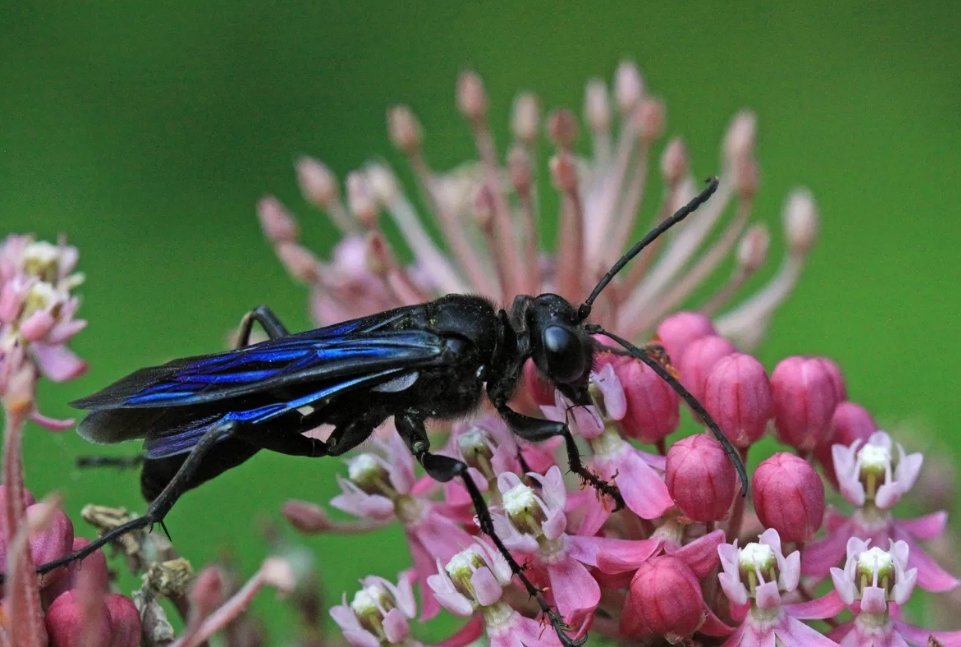Professional Wasp Control & Prevention
Great Black Wasp Removal Chicago | Large Wasp Removal
There are several wasps throughout the world. Because of its distinct weather and temperature, the western United States attracts stinging pests such as numerous wasp species that other sections of the country do not. In this section of the country, there are also a number of larger wasps with painful stings.
Wasps such as the gorgeous, but potentially painful, Tarantula Hawk Wasp can be found throughout the western United States. Other solitary wasps may not build large nests or infestations, but they may build nests surrounding your home, putting you, your family, or your pets at risk of unpleasant stings. The huge black wasp is one of the most common.
ATAP exterminators are professionals in the elimination of Great Black Wasps and other stinging pests. If you are being swarmed by wasps, contact your local ATAP Exterminator office right away.
Free Wasp Extermination Quote
Wasp Removal Pest Control Services in Illinois
There is no reason for the homeowner to suppress the great black wasp because it is not aggressive and is an excellent predator of hazardous insects as well as a good pollinator of flowering plants. If their presence alarms you, get away from the wasp slowly and gently and contact your pest management professional for assistance and recommendations. ATAP professionals are available to help you solve your pest problem quickly and easily!
You don’t have to tolerate wasps. Call us and request a free phone consultation for the right wasp extermination treatment for you.

Great Black Wasp: What Are They?
Sphex pensylvanicus is the scientific name for the huge black wasp. They are a type of digger wasp that can be found throughout North America. They may be found on both the east and west coasts of North America and have proven to be extremely adaptable to the weather. However, the western United States’ year-round temperature permits these wasps to be active all year.
Innovative Equipment
We use the newest and most effective equipment for pest control services.
Focused Service
We specialize in wasp control service, pest control and pest control treatment services for your home and your commercial property. Pest control for wasps, we can do it in our sleep! Trust our wasp control services experts.
Wasp Identification| Comprehending Great Black Wasp
As the name implies, the great black wasp is a very large wasp species. This wasp is black and monochrome, with no visible stripes, spots, or other patterns on its body. Adult females of the species grow to be about 1 to 12 inches long and are slightly larger than males.
Habits and Food Consumption
This wasp is thought to be found in the eastern two-thirds of the United States. Great black wasps are not hostile since they lack a nest to defend and are classified as solitary wasps. Although their common name sounds scary, the moniker is derived from the insect’s size rather than its aggressiveness. Male adults cannot sting, and their primary role in nature is to mate. Females can sting, but only if their nest is in danger. Great black wasps are subterranean wasps, which means they dwell underground and build little underground nests where they raise their young.
These insects collect food, most typically grasshoppers, locusts, cicadas, and other large, “fleshy” insects, and feed it to their juvenile progeny. They can be seen flying with paralyzed insect prey in their teeth and inserting the immobilized bug into the underground nest in regions where this insect lives. Female adults must consume a lot of high-energy food because of all the hunting they conduct. As a result, nectar from nearby flowers is their principal food source.
Their preferred habitat is in locations where prey can be found, such as meadows, pastures, and residential areas with gardens, landscaping plants, and flowers.
Stings
Because large wasps are great solitary wasps, they do not have a vast colony to defend as social wasps do. As a result, they are not aggressive, and only the female adult can sting. Even though they may sting, they only do so when provoked and their nest is threatened.
It is therefore essential to use a qualified wasp eradication technician. We have performed pest control in the region for more than 15 years. We have assisted tens of thousands of people with insect problems, including wasp removal, and I am convinced that we can assist you as well. For the best exterminators in Chicago, please call (773) 701-7705 or fill out the contact form on the right!
Wasps and Their Importance
Wasps are important to the ecology and thrive in summer. Wasps eat arachnids and bug bugs, such as ants and caterpillars, by laying their eggs on or within other pests or spiders. Wasps pollinate like bees. April is when young queen wasps emerge from hibernation and start building nests from chewed-up wood fibers and saliva. The queen’s workers hatch from eggs she fertilized with sperm she collected the previous fall.
The queen lays eggs in May, which hatch into larvae fed vermin by worker wasps. The second set of hatching larvae pupates in January. This process will continue throughout the summer. By May, dozens of workers help build the nest and care for the larvae. The wasp nest grows and is most active in June and July. By July, hundreds of wasps had grown up in the nest, and hundreds more were in eggs or newly hatched.
Wasp activity slows in August, September, and October as workers die and the queen lays fewer eggs. During these months, she lays fertile males and females instead of sterile female workers. Young queens mate with viable males and fly away after the queen dies. Fertile guys die last.
Summer brings more wasps, which is good and unpleasant. We’ll tackle the issue first. If you notice a lot of wasps today, they may have a nest nearby. You can fix it. Controlling Wasps! Here’s everything to know about summer wasps. Understanding what makes summer’s poisonous stingers tick can help you avoid them. Queen wasps return to their overwintering habitats in the spring to nest.
The wasp queen lays eggs in a suitable nest to start a new colony. The hatchlings build the nest as the queen reproduces. Summer is peak wasp season. Hundreds to thousands of worker wasps look for food to feed their young all day. Greater wasp populations mean more wasps. Wasps aren’t always more busy in the summer; there are just more. Summer wasps rarely leave their nests, luckily.
Wasp FAQs
Can Black Wasps Make Nests?
Yes, black wasps make nests. Unlike yellow jackets and paper wasps, however, the giant black wasp digs its nest into the ground. They are mostly solitary wasps that do not form large colonies like other species, yet their nests can contain many larvae and eggs.
How Does Its Habitat Look?
Black wasps, like the Tarantula Hawk Wasp, are parasitic and lay their eggs on other insects. The Tarantula Hawk prefers enormous spiders, whilst the giant black wasps prefer katydids and large grasshoppers.
What is the process by which black wasps lay their eggs?
Black wasps sting their victims three times. This paralyzes but does not kill the target. The female wasp then drags their prey underground after carrying it back to the underground nest. They will lay their eggs directly on the stomach or underneath the prey bug. The eggs eventually hatch and begin to devour the katydid or grasshopper. The prey is kept alive for as long as possible while the larval wasps feed and grow large enough to exit the nest.
Is it painful to get stung by a black wasp?
The quick answer is yes. The only wasps that will sting are female black wasps. Being solitary wasps, being stung by a black wasp is extremely rare and difficult. However, if a person handles or threatens a great black wasp, they may receive a terrible sting. Although the sting is unpleasant, it is not as terrible as the sting of Tarantula Hawk Wasps or other species.
Despite this, it is probably advisable not to approach a great black wasp and risk being stung.
Are Great Black Wasps a Threat?
The sting of the giant black wasp is painful, but it is not considered harmful. The exception is that if you are allergic to insect stings, a great black wasp sting may be as dangerous as others. If you have an adverse reaction to a black wasp sting, get medical assistance right once.
Although an infestation of great black wasps is unusual due to their solitary nature, if you do become infested with wasps of any kind, ATAP Pest Control may assist in removing them. ATAP Exterminators can keep your family safe from wasp stings. Our professionals can identify the sort of wasps present and advise you on how to remove them. Contact Us Today For A FREE Phone Pest Estimate!
Clients share their experience with Our Wasp Treatments







